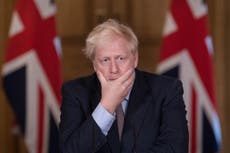HMRC boss says UK businesses face £7.5 billion cost in post-Brexit paperwork
Costs will apply regardless of outcome of Brexit trade negotiations
Your support helps us to tell the story
From reproductive rights to climate change to Big Tech, The Independent is on the ground when the story is developing. Whether it's investigating the financials of Elon Musk's pro-Trump PAC or producing our latest documentary, 'The A Word', which shines a light on the American women fighting for reproductive rights, we know how important it is to parse out the facts from the messaging.
At such a critical moment in US history, we need reporters on the ground. Your donation allows us to keep sending journalists to speak to both sides of the story.
The Independent is trusted by Americans across the entire political spectrum. And unlike many other quality news outlets, we choose not to lock Americans out of our reporting and analysis with paywalls. We believe quality journalism should be available to everyone, paid for by those who can afford it.
Your support makes all the difference.British businesses face an “administrative burden” cost of £7.5bn a year in filling out customs paperwork after the Brexit transition period, the chief executive of HMRC has said.
Highlighting the additional bureaucracy facing UK firms next year, Jim Harra said HMRC’s estimate of the cost from 2018 “still stands”, with millions of extra customs declarations being made after the transition period.
As London and Brussels continue attempts to thrash out a free-trade agreement with just weeks remaining, Mr Harra reiterated the extra red-tape will apply regardless of the outcome of the negotiations.
Due to the UK leaving the bloc’s customs union and single market, thousands of businesses trading with the EU after the transition period in January will be required to fill in customs declarations for the first time.
The first permanent secretary and chief executive at HMRC said he expected 265 million customs declarations made in the UK each year when the new system is phased in – an increase of 211 million on the number of declarations made in 2017.
Appearing at a session of Westminster’s Treasury Committee, Mr Harra said: “This is largely unaffected by the outcome of negotiations with the EU about free trade agreements because whether there is or not a free trade agreement customs declarations will have to be made when we leave the customs union and therefore the costs, by and large, will apply in either scenario.”
Pressed on reports in the Financial Times earlier this year that the cost of declarations will reach £7bn a year, Mr Harra told MPs: “That is a figure I recognise.”
He added: “My department published figures towards the end of 2019 in which set out what we expected the administrative burden to be of completing additional customs declarations. I don’t think we published any further update to that.
“The figure still stands and that from recollection is about £7.5bn for the cost of the UK side of completing declarations.”
“In 2017 there were 54 million customs declarations made in the UK. At the end of the transition period we would expect that to group to 265 million. That won’t apply straight away because import controls are being staged in over six months, but that’s the rate we expect to see them from July.”
The Liberal Democrat leader Ed Davey said in response: “Four and a half years after the referendum, and the Conservatives are still leaving businesses up and down the country completely in the dark. Even if Boris Johnson does now get a deal, just the administrative burden alone is set to cost British business £7.5bn.
“That is why I have written to the prime minister urging him to negotiate an adjustment period of three to six months with the EU. Businesses are facing a huge task of facing Brexit in the midst of a pandemic, and if this government want them to survive the next few months, then they need to act and give them some breathing space.”
It comes as Michel Barnier, the EU’s chief negotiator, gave a downbeat assessment of the struggling talks over a future trading agreement, telling MEPs in a closed meeting on Monday that negotiations were now in their “endgame” and would need to be wrapped up by Wednesday.
The new deadline is ahead of a summit of the 27 EU leaders in Brussels on Thursday, which is widely seen as the last formal opportunity for an agreement to be signed off before it is then voted on in both the European parliament and Westminster.




Join our commenting forum
Join thought-provoking conversations, follow other Independent readers and see their replies
Comments